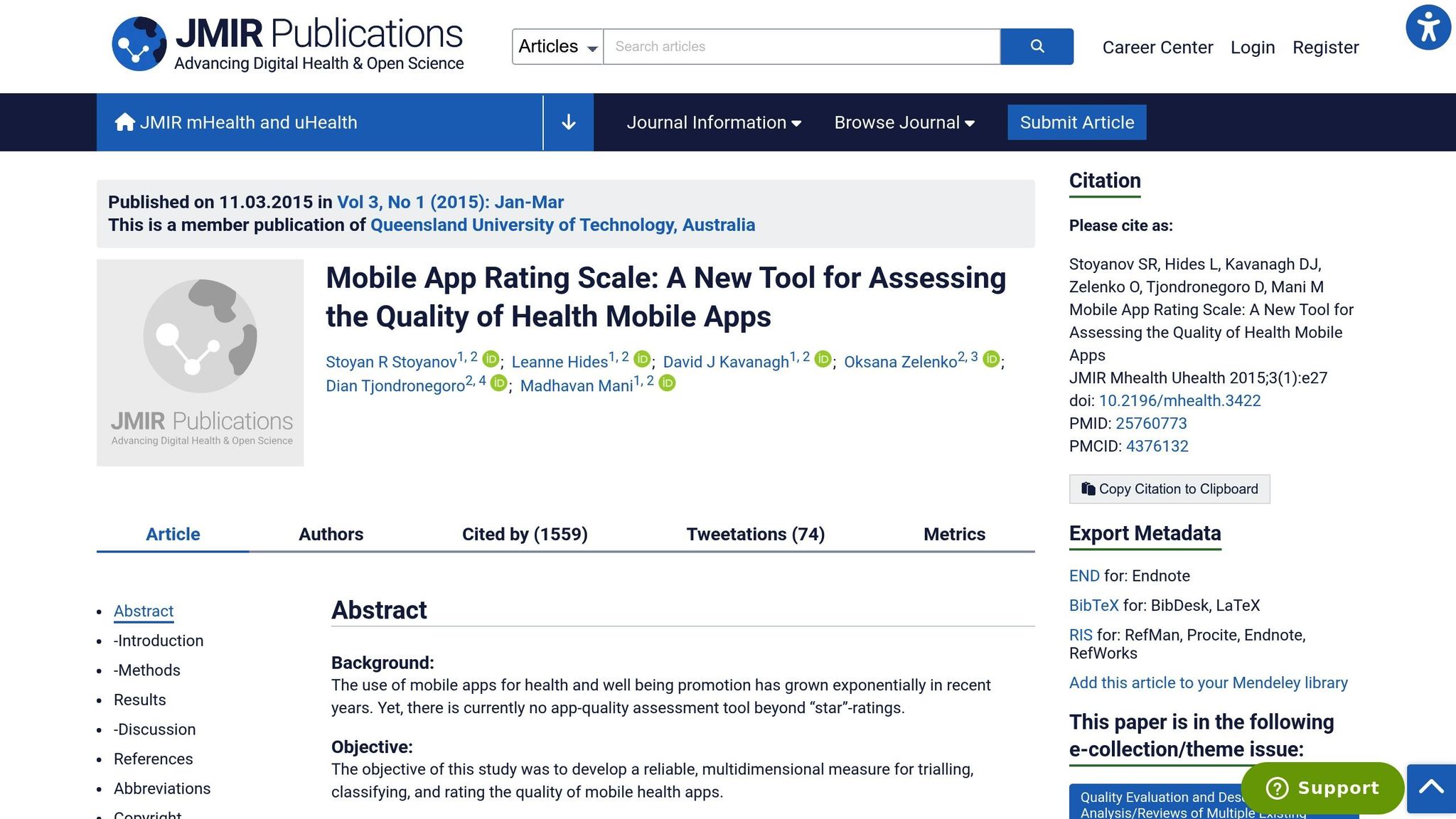Using AI to help your PCOS journey

Managing PCOS can be a challenge due to its unpredictable symptoms and personal variations. AI tools are now offering smarter, customized solutions to make this process easier. Here's how AI helps:
- Period Tracking: AI analyzes irregular cycles and symptoms to provide accurate predictions and alerts.
- Fertility Support: Tracks hormonal patterns to identify ovulation windows and improve diagnostics.
- Nutrition Guidance: Suggests meal plans tailored to hormonal and metabolic needs.
- Mental Health Tools: Provides 24/7 emotional support through chatbots, mood tracking, and therapy resources.
These tools simplify PCOS management by combining health data into actionable insights, helping you take control of your well-being. Pairing AI with medical advice can make your PCOS journey more manageable and effective.
Assessing PCOS Apps: A MARS-Based Quality Evaluation

AI-Based Period and Symptom Tracking
When it comes to managing PCOS, tracking periods and symptoms can feel like trying to solve a puzzle with missing pieces. For many women, irregular cycles and unpredictable symptoms make traditional tracking methods - like calendars or basic apps - less than ideal. Enter AI: a game-changer that brings clarity by analyzing your data to uncover hidden patterns.
AI-powered trackers go beyond the basics. By evaluating factors like sleep, stress, diet, and hormonal fluctuations, these tools create a comprehensive picture of your unique PCOS patterns. They’re especially adept at handling irregular data. Unlike standard apps that rely on averages, AI systems learn from your cycle variations and make predictions based on a broader set of factors, not just past cycle lengths.
How AI Improves Period Tracking
AI reshapes period tracking by recognizing that PCOS doesn’t follow a one-size-fits-all template.
Using machine learning, these tools analyze daily inputs such as body temperature, cervical mucus changes, mood shifts, energy levels, and sleep patterns. Over time, they identify the subtle signals your body sends to indicate hormonal changes.
Another standout feature is how AI connects the dots between symptoms that might otherwise seem unrelated. For example, acne flare-ups, mood swings, bloating, or unexpected hair growth can all tie back to hormonal shifts. AI helps you see these connections, making it easier to anticipate and manage clusters of symptoms.
Personalized notifications are also a game-changer. Instead of generic reminders, AI-powered apps send tailored alerts - like a heads-up about potential PMS symptoms or a suggestion to schedule a check-up during a time when you’re likely to feel your best.
AI vs. Standard Tracking Methods
The differences between AI-powered trackers and traditional methods are striking, especially for PCOS management:
| Feature | Standard Tracking Methods | AI-Powered Tracking |
|---|---|---|
| Cycle Prediction | Relies on averages from previous cycles | Analyzes biomarkers and environmental factors |
| Symptom Analysis | Manual logging with a basic calendar view | Identifies patterns and correlations |
| Personalization | Generic approach | Tailored to your individual PCOS patterns |
| Data Processing | Simple calculations and averages | Advanced pattern recognition and machine learning |
| Handling Irregular Cycles | Struggles with variability | Learns and adapts over time |
| Actionable Insights | Basic reminders and summaries | Personalized recommendations and predictive alerts |
Unlike traditional apps that stick to static insights, AI-powered tools continuously adapt, refining their predictions as they gather more data about your unique cycle.
One of the biggest benefits? AI takes the guesswork out of the equation. By providing clear, data-driven insights, these tools reduce the mental load of managing PCOS. Instead of trying to figure out what every symptom means, you can plan your life around your cycle with confidence.
Next up, let’s explore how AI supports fertility prediction and ovulation tracking.
AI-Driven Fertility Prediction and Ovulation Support
For women with PCOS, fertility challenges are often tied to irregular ovulation and hormonal imbalances. AI is reshaping how these obstacles are addressed by analyzing multiple data sources - like basal body temperature, cervical mucus changes, and hormone surges - to identify fertile windows, even when traditional calendar-based methods fall short.
Unlike conventional tracking, which often relies on limited data, AI systems can simultaneously process a variety of physiological markers, such as luteinizing hormone surges, offering a more nuanced and accurate approach.
Fertility Prediction with AI
AI-powered tools are designed to adapt to the unique hormonal patterns of PCOS. By analyzing factors like temperature shifts, heart rate variability, sleep quality, and stress levels, these tools can signal ovulation and even flag non-ovulatory cycles. This can prompt timely discussions with healthcare providers, ensuring that potential concerns are addressed early.
The technology works by identifying biomarker patterns that precede ovulation. It also accounts for external factors like travel, illness, or medication changes, refining predictions even when routines are disrupted. This flexibility makes AI an invaluable resource for those navigating the complexities of PCOS.
AI in Fertility Diagnostics
AI isn't just about prediction - it’s also advancing fertility diagnostics. For example, AI-enhanced ultrasound technology can more accurately identify polycystic ovaries and monitor follicle development.
One notable advancement is automated follicle tracking. By analyzing ultrasound images, AI can count and measure follicles with consistency, helping doctors better determine the timing for fertility treatments. This reduces variability in measurements and supports more reliable treatment planning.
AI also improves hormone analysis. Instead of evaluating hormones like testosterone, insulin, LH, and FSH in isolation, AI systems analyze patterns across multiple hormones. This creates a more complete picture of reproductive health. Some platforms are even exploring ways to predict how individuals might respond to fertility medications, which could help optimize treatment protocols.
Comparing Fertility Tools
AI-powered tools offer distinct advantages over traditional methods when managing PCOS-related fertility challenges:
| Feature | Traditional Methods | AI-Powered Tools |
|---|---|---|
| Cycle Irregularity Handling | Struggles with highly irregular cycles | Adapts to individual cycle variability |
| Ovulation Prediction Window | Broad, less precise estimates | Narrow, targeted fertile windows |
| Detection of Non-Ovulatory Cycles | Often misses non-ovulatory patterns | Effectively identifies non-ovulatory cycles |
| Multi-factor Analysis | Considers only a few indicators | Combines multiple data points |
| PCOS-Specific Considerations | Limited focus on PCOS nuances | Tailored for hormonal variations in PCOS |
| Treatment Integration | Separate from clinical care | Offers insights to aid clinical decisions |
For women with PCOS, this precision is a game changer. While traditional methods might suggest a wide fertile window, AI tools can narrow it down, making timing easier to manage. Some tools even provide confidence scores, indicating the likelihood of ovulation and helping users decide whether to focus on conception or consult a doctor about non-ovulatory cycles.
What’s more, many AI fertility tools sync with wearables like fitness trackers and smart thermometers. This integration reduces the need for manual tracking and offers a fuller picture of overall health and well-being.
Personalized Nutrition and Lifestyle Recommendations
AI has moved beyond symptom tracking to deliver precise nutrition and lifestyle guidance, offering a more tailored approach to managing PCOS. Since PCOS often requires a multifaceted strategy, these tools analyze personal health data, dietary habits, and lifestyle patterns to create targeted plans that address individual challenges.
By examining how factors like insulin resistance, hormonal shifts, and metabolism interact, AI provides strategies tailored to your unique needs. It considers elements such as blood sugar trends, inflammation markers, stress, and sleep quality to develop wellness plans that evolve alongside your body. Let’s delve into how AI customizes nutrition and lifestyle strategies for PCOS management.
Tailored Nutrition Plans
AI-powered platforms craft meal plans designed specifically for your PCOS profile, addressing symptoms and metabolic needs. These tools evaluate key factors like insulin sensitivity, androgen levels, and inflammation to recommend foods that promote hormonal balance and metabolic health.
For example, AI systems track how your body reacts to certain foods and meal timings, adapting future suggestions to include low glycemic index options or pairing foods with protein and healthy fats to stabilize blood sugar.
The personalization doesn’t stop there. These tools also account for food preferences, cultural eating habits, and budget limits. You might see recommendations for anti-inflammatory spices like turmeric or cinnamon, omega-3-rich foods to support hormone regulation, or meal timing strategies to improve insulin sensitivity.
Even portion sizes and macronutrient ratios are adjusted based on your activity levels, weight goals, and metabolic rate. Some platforms go a step further by aligning dietary suggestions with your menstrual cycle, recognizing that nutritional needs can shift throughout the month for women with PCOS.
Lifestyle Optimization with AI
AI doesn’t just stop at nutrition - it also fine-tunes other lifestyle factors to manage PCOS more effectively. By analyzing your daily habits, stress levels, sleep patterns, and physical activity, these systems recommend interventions that can reduce symptoms and improve overall well-being.
For exercise, AI creates routines tailored to your fitness level and PCOS symptoms. If insulin resistance is a concern, the focus might be on strength training to build muscle and improve glucose uptake. For those dealing with high stress, AI could suggest yoga sequences or low-impact cardio to regulate cortisol without overloading your system.
Sleep guidance is another area where AI shines. These tools assess your sleep patterns and evening habits to suggest bedtime routines, temperature adjustments, or relaxation techniques to enhance rest quality. Better sleep often leads to improvements in insulin sensitivity and hormonal balance, which can significantly alleviate PCOS symptoms.
Stress management is also highly personalized. AI might recommend meditation practices, breathing exercises, or time management techniques that fit seamlessly into your schedule, addressing the chronic stress that can worsen PCOS symptoms.
Impact of Personalized Recommendations
AI-driven recommendations can make a measurable difference in managing PCOS. Women following these tailored plans often see more consistent improvements compared to generic advice.
For instance, weight management becomes more effective when plans are based on metabolic profiles rather than traditional calorie counting. Hormonal balance improves, often evidenced by more regular cycles, clearer skin, and reduced hirsutism. Additionally, energy levels and mood stability benefit from strategies that stabilize blood sugar and enhance sleep quality.
As your body adapts, AI refines its recommendations, creating a feedback loop that builds on what works while discarding what doesn’t. This dynamic approach ensures increasingly effective management over time.
Mental Health Support Through AI
Taking care of emotional well-being is just as important as managing physical health and nutrition when addressing PCOS. This condition often brings emotional hurdles that traditional healthcare might not fully address. Concerns about symptoms, fertility issues, body image, and unpredictable hormonal changes can weigh heavily on mental health. Thankfully, digital tools powered by AI are stepping in to fill this gap, offering tailored support that aligns with each individual's emotional needs and triggers.
AI for Emotional Well-Being
AI-driven mental health tools provide a variety of ways to tackle emotional challenges tied to PCOS. For instance, chatbot therapy offers immediate guidance during difficult times, presenting coping mechanisms when traditional therapy isn’t readily available. Other features, such as guided therapy sessions, peer support networks, and mood tracking, allow users to monitor their emotional patterns and fine-tune their self-care routines by linking emotional states with physical symptoms.
Accessibility of AI Mental Health Platforms
One of the standout benefits of AI mental health platforms is their 24/7 availability, delivering immediate help whenever it's needed. They also tend to be more budget-friendly, making mental health resources accessible to a broader audience.
These platforms are particularly valuable for individuals in remote areas with limited access to specialized mental health care. By connecting users regardless of location, they break down geographic barriers. Additionally, the private and discreet nature of digital tools can make seeking help feel less intimidating, reducing the stigma often tied to mental health support.
When paired with other AI-driven insights, these tools create a comprehensive approach to managing the complexities of PCOS, addressing both physical and emotional challenges in a unified way.
Conclusion: Using AI for Complete PCOS Management
AI has become an essential ally in managing PCOS, offering tools that bring together advanced tracking, fertility insights, personalized nutrition, and mental health support. By integrating these elements, AI simplifies the complexities of PCOS care, making it more approachable and effective.
These technologies complement traditional care by acting as a support system. For instance, AI-driven tracking tools can uncover patterns and triggers you might not notice on your own, while fertility prediction algorithms offer valuable guidance during conception efforts. On top of that, customized lifestyle suggestions ensure your care plan adapts as your needs evolve.
Mental health platforms powered by AI add another layer of support, providing 24/7 accessibility. Whether you're dealing with the emotional toll of a hormonal imbalance in the middle of the night or navigating a particularly rough cycle, these tools are there when you need them most.
The key is finding the right combination of tools that fit your unique needs. Start by addressing the area that feels most challenging - be it tracking symptoms, managing your diet, or supporting your mental health - and gradually expand your toolkit.
For additional guidance, platforms like mypcoslife.com offer evidence-based insights and tailored strategies to enhance your approach to PCOS care. Keep in mind that while AI tools are powerful, they work best when paired with professional medical advice and a supportive community.
With AI, you can gain better insights into your condition and take meaningful steps toward managing your well-being. Let AI be a partner in your journey to living well with PCOS.
FAQs
How can AI make period and symptom tracking more accurate for women with PCOS?
How AI Improves Period and Symptom Tracking for Women with PCOS
AI brings a new level of precision to tracking menstrual cycles and symptoms for women with PCOS. By leveraging advanced algorithms, it analyzes vast amounts of health data, including patterns in menstrual cycles, hormonal changes, and related symptoms. Unlike traditional methods that often rely on one-size-fits-all criteria, AI adapts to the unique complexities of PCOS, providing insights tailored to each individual.
What makes AI especially valuable is its ability to spot subtle trends and connections that might otherwise go unnoticed. For example, it can identify irregular periods, hormonal imbalances, or other symptoms earlier and with greater accuracy. This is crucial, as PCOS symptoms often overlap with issues like obesity or diabetes, making diagnosis and management more challenging.
With AI-driven tools, women gain a clearer understanding of their cycles, can monitor changes over time, and make informed decisions to support their overall health. These insights empower users to take a more proactive approach to managing PCOS and improving their well-being.
How can AI tools help track ovulation and predict fertility for women with PCOS and irregular cycles?
AI-powered tools are transforming fertility tracking for women with PCOS by analyzing crucial physiological data, such as hormonal fluctuations, basal body temperature, heart rate, and other indicators. These tools rely on advanced algorithms to detect patterns and pinpoint ovulation, even when cycles are irregular.
What’s more, over time, these apps and devices adapt to your unique cycle patterns, offering increasingly accurate predictions and insights. This not only simplifies fertility tracking but also provides a clearer understanding of your reproductive health, helping you better plan or manage your journey.
How can AI provide personalized nutrition and lifestyle recommendations to help manage PCOS symptoms?
AI technology can evaluate your specific health data to create personalized nutrition plans designed to help manage PCOS symptoms. These plans might include ideas like adding low glycemic index foods, meals rich in fiber, or omega-3-packed options to assist in regulating insulin levels and maintaining hormonal balance.
Beyond nutrition, AI-powered tools can also deliver tailored lifestyle recommendations. Whether it’s crafting exercise routines that match your fitness level or suggesting stress-relief techniques, these tools adjust to your needs in real-time. This flexibility makes it easier to monitor your progress and stay focused on managing your PCOS effectively.
